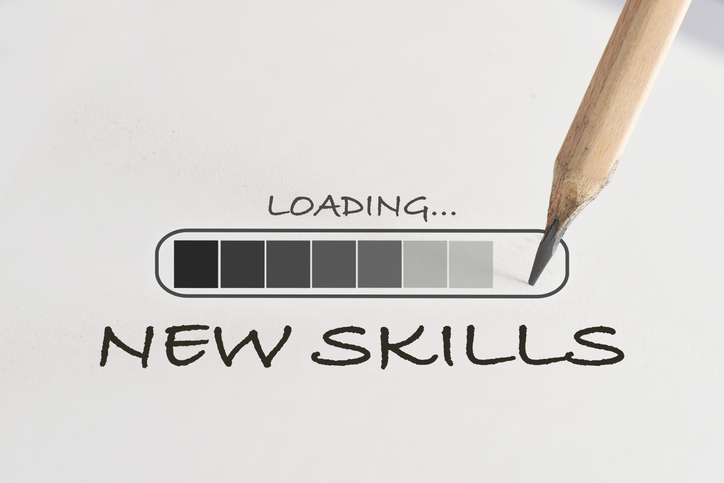If you’re looking to find an accounting job, you may have noticed that employers often list strong communication skills and sales/client management experience as requirements for their open positions. You might be wondering why these two items are needed if accounting isn’t typically seen as a people-focused industry. The truth is that understanding how to sell yourself– both in an educational setting and in the workplace – can help you succeed professionally in the accounting profession. Technical accounting skills are the foundation of accounting education. However, in today’s accounting profession, technical skills are not enough to grow your career by themselves. Your career growth comes from developing your power skills.
What are power skills?
What exactly are power skills? The first time I heard the term power skills, I presented an improv workshop to the incoming Master of Science in Accounting students at Oklahoma State University. However, before I began my session, the chair of the accounting department, Dr. Audrey Gramling, addressed the importance of developing their power skills, aka soft skills. You see, this is the mission of Oklahoma State University School of Accounting, which is “to prepare people to make a difference in the world by teaching essential interpersonal skills alongside a high-quality accounting education backed by impactful research and outreach.” And to steal a phrase from Guy Fieri, they are “spot on.”
Power skills are helpful in just about any career and essential to communicating accounting complexities to those non-accounting business leaders. They include aspects like curiosity, self-awareness, empathy, and more. According to The Josh Bersin Company blog titled “Let’s Stop Talking About Soft Skills: They’re PowerSkills, states that, “the skills of the future are not technical; they’re behavioral. Yes, engineers, designers, and technical people need to know how to build and fix things.” The article goes on to state that IBM’s latest research lists the top 5 Power Skills that are most critical to the workforce today are:
1. “Willing to be flexible, agile, and adaptable to change.”
2. “Time management skills and ability to prioritize.”
3. “Ability to work effectively in team environments.”
4. “Ability to communicate effectively in a business context.”
5. “Analytical skills and business acumen.”
Considering how important they are for success both in your professional life and personal development, it makes sense to begin the process of learning these power skills in the university classroom. Being a former university professor, I understand the politics that go into a well-rounded education, and making room for new courses is a challenge. However, if higher education would adopt the first power skill and “be flexible, agile, and adaptable to change,” a solution can be obtained.
One potential solution is that if your state requires the 150-hour rule to be licensed in your state, then add these power skills courses into the Master of Accounting programs. However, the extra 30 hours, in many states like Ohio, do not have a mandate on the type of courses that qualify.
Ability to communicate effectively in a business context
A few years ago, my doctor ordered some tests because I was not feeling well. A few days later, my doctor called me, not her assistant, and said she got the results back from the tests. Then she went into this tsunami of medical lingo and gibberish, and I had no clue what she was trying to tell me. So, I said to her, “Doctor, stop! I have no idea what you are trying to tell me. Can you tell me in plain English?” There was a pause, and then she said, “you may I cancer.” Wow. Thankfully, I did not have cancer.
The experience with my doctor is the same experience accountants have when communicating with non-accountants. Accountants speak the foreign language of business – accounting, which is no different from speaking Spanish, Greek, or Chinese to someone who is not fluent in that language. We need to be cognizant of this fact and become better translators of technical accounting knowledge. We need to start taking the numb out of numbers!
Translating technical accounting into plain English is not an easy task, and it takes time. Where should we start? I know, in a college classroom! The ability to develop this skill in the safety of the classroom is ideal. The classroom allows us to experiment, fail, hone, and gain confidence. Oh, you are stuck on the word fail. Then think of it as an acronym, First Attempt In Learning. Failure is part of the process when we view learning any new skill. For example, we don’t pick up a golf club for the first time and make solid contact or contact at all. Same with learning new skills. How do you eat an elephant? One bite at a time.
Change is necessary to be relevant.
Higher education needs to change how accounting is taught and align it with the critical power skills required to succeed in today’s business climate. Technical knowledge is essential, and a lot of the technical – nuts, bolts, calculations – is done with artificial intelligence. We need to ensure that the calculations are accurate. However, our role as an accountant is evolving into a position of a business advisor and out of being thought of as a number cruncher. Let’s find a way to start this transformation of the accounting profession in the classroom instead of making it the employer’s responsibility. Let’s begin to embrace the term ‘Financial Leadership’ – and teach and prepare with excellence in technical accounting skills and power skills – a win/win for everyone!
If this article resonated with you and you would like to learn more, contact me at petr@petermargaritis.com

